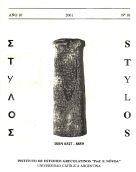Please use this identifier to cite or link to this item:
https://repositorio.uca.edu.ar/handle/123456789/3996| Título: | Participios activos de forma pasiva en el Amadís de Gaula de Garci Rodríguez de Montalvo | Autor: | Suárez Pallasá, Aquilino | Palabras clave: | Amadís de Gaula; Rodríguez de Montalvo, Garci; LITERATURA ESPAÑOLA; LIBROS DE CABALLERIA; GRAMATICA; ANALISIS LITERARIO | Fecha de publicación: | 2006 | Editorial: | Universidad Católica Argentina. Facultad de Filosofía y Letras. Instituto de estudios grecolatinos "Prof. F. Nóvoa" | Cita: | Suárez Pallasá, Aquilino. “Participios activos de forma pasiva en el Amadis de Gaula de Garci Rodriguez de Montalvo” [en línea], Stylos, 15 (2006). Disponible en: https://repositorio.uca.edu.ar/handle/123456789/3996 | Resumen: | Resumen: Mediante el sufijo *-to se derivaban en indoeuropeo adjetivos deverbativos y denominativos para expresar que el referente del nombre al cual se aplicaban o el referente del nombre derivado con él estaban dotados de la propiedad designada por el lexema del derivado. Característica semántica saliente de los deverbativos, en particular, era el no indicar ni actividad ni pasividad. Con los adjetivos deverbativos de esta clase se construyó en la lengua latina buena parte de su paradigma verbal. En este paradigma los adjetivos verbales actuaron como participio perfecto, y en unos casos fueron pasivos mientras que en otros con igual forma fueron activos. En las lenguas romances y en espaiíol el participio pasado o perfecto en -ado e -ido siguió siendo pasivo y a veces activo. Pero, como activo, no lo fue simplemente por conservación de una función arcaica recibida a través del latín, sino por la creación renovada de formas de idéntico valor antiguo. Estos participios activos de forma pasiva abundan, pues, como adjetivos y constituyen un extenso repertorio. Pero mucho más notables que ellos, como adjetivos comunes, son los que, como adjetivos propios, han constituido elemento lexemático único o segundo elemento lexemático de nombres propios personales y geográficos compuestos, como Amadis, Cámara Defendida, [mula no Fallada, etc. Se propone una reinterpretación de algunos adjetivos y nombres, comunes y propios, de acuerdo con el mencionado valor activo de sus formas pasivas. Abstract: By means of the suffix *-to deverbative and denominative adjectives were constructed in the Indo-European language to express that the referent of the name to which they were applied or that the referent of the derivate name were endowed with the property indicated by the lexeme of the derivate. It was the special semantic charaeteristic of this class of deverbatives that of their indistinetion of active nor passive meaning. In Latin, a good deal of its verbal paradigm was eonstructed by means of this c1ass ofdeverbative adjeetives. In this paradigm verbal adjectives acted as perfect participles, sorne ofwhich had passive meaning while other on the contrary had active meaning. In the Romanie languages and speeially in Spanish the past or perfect partieiple ended in -ado -ido had passive and sometimes active meaning too. As to their having active meaning, they were not so by maintaining simply the arehaie function received from Indo-European through Latin, but by renewed creation of forros with identical aneient value. These active participles with passive form abound in the function of adjectives, and form an extended repertory ofthem. But mucb more notable than tbem, functioning as common adjectives, are those that, functioning as proper adjectives, have constituted either the only lexematíc element or the second one of personal or geographic compounded proper names, as Amadís, Cámara Defendida, Ínsula no Fallada, etc. It is proposed bere a reinterpretation of sorne adjectives and names, both common and proper, in accordance with the aforesaid active meaning of their passive forms. |
URI: | https://repositorio.uca.edu.ar/handle/123456789/3996 | ISSN: | 0327-8859 | Disciplina: | LITERATURA | Derechos: | Acceso Abierto | Fuente: | Stylos Nº 15, 2006 |
| Appears in Collections: | STY - 2006 nro. 15 |
Files in This Item:
| File | Description | Size | Format | |
|---|---|---|---|---|
| participios-activos-forma-pasiva.pdf | 1,44 MB | Adobe PDF |  View/Open |
Page view(s)
115
checked on Apr 27, 2024
Download(s)
451
checked on Apr 27, 2024
Google ScholarTM
Check
This item is licensed under a Creative Commons License

